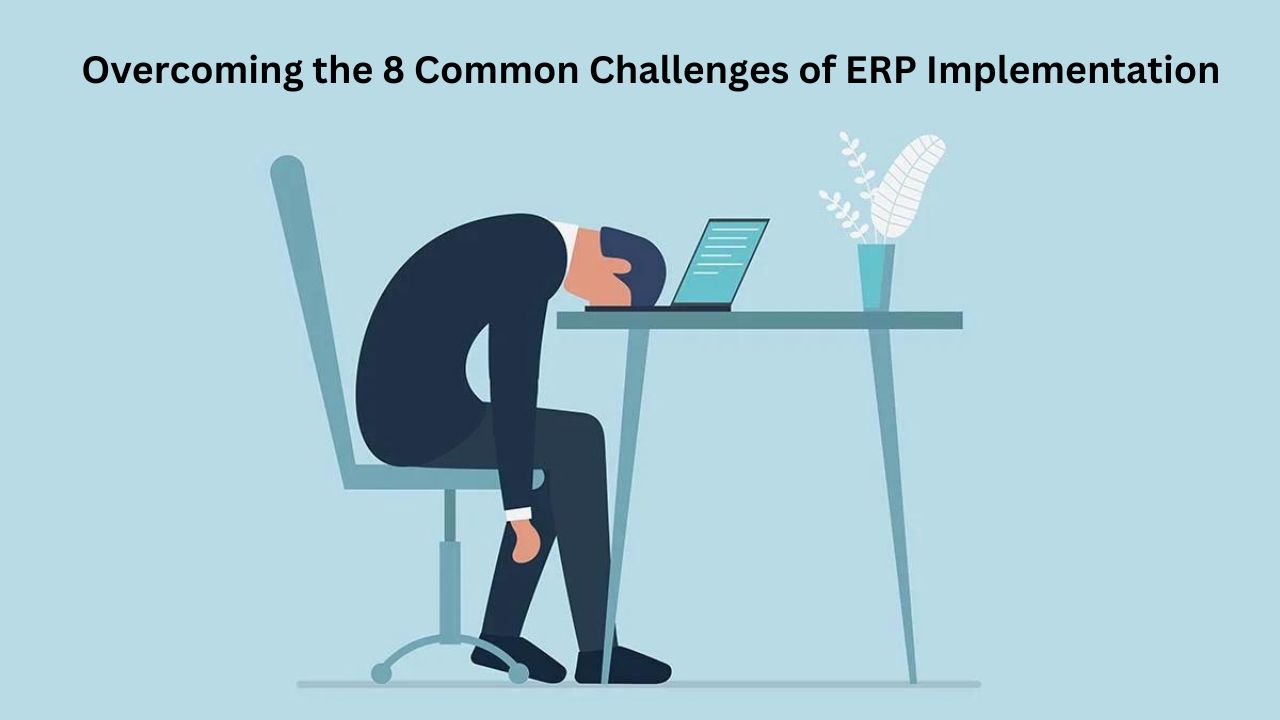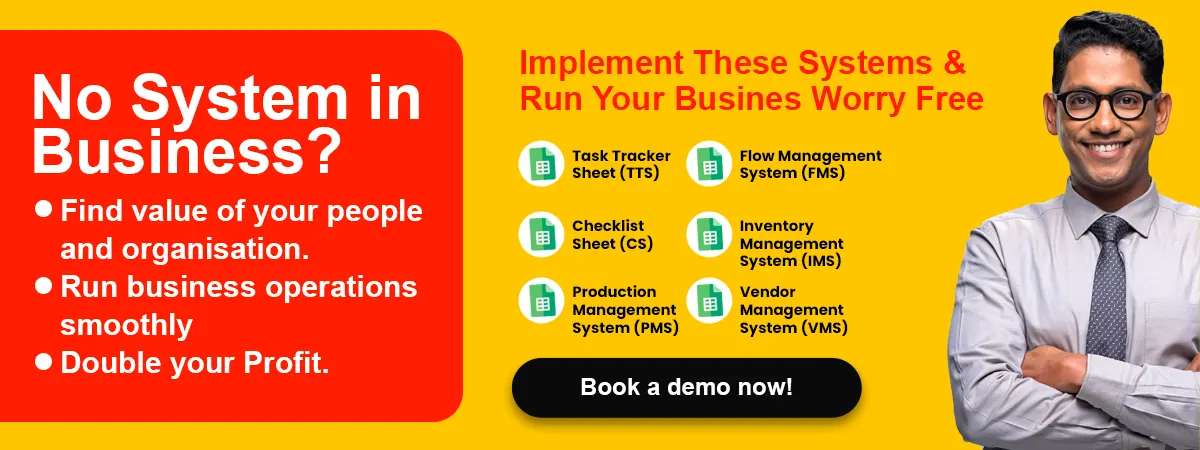by Subhadeep Chowdhury
Share

In today’s fast-paced business world, Enterprise Resource Planning (ERP) systems have become essential tools for organizations seeking to streamline their operations, improve efficiency, and gain a competitive edge.
However, while the benefits of ERP implementation are significant, so too are the challenges that often accompany this complex process. Successfully navigating these challenges is crucial to achieving a smooth and effective ERP implementation.
Also read: What Is Enterprise Resource Planning
Common Challenges of ERP Implementation
So, today, in this blog post, we will explore the eight common challenges of ERP implementation and provide valuable insights on how to overcome them. Whether you are considering implementing an ERP system or are in the midst of the process, understanding these challenges and their solutions will be instrumental in ensuring a successful ERP implementation for your organization.
Let’s get started.
-
Lack of Clear Objectives and Strategy:
One of the most prevalent hurdles in ERP implementation is the absence of clear objectives and a well-defined strategy. When an organization embarks on this transformative journey without a crystal-clear understanding of the ERP system’s purpose and its alignment with the broader business strategy, it’s akin to setting sail without a map or destination in mind.
This ambiguity can lead to a myriad of issues, including scope creep, misallocated resources, and project delays. To ensure a successful ERP implementation, it is imperative to meticulously define the goals, objectives, and strategy, ensuring that every member of the organization comprehends the system’s role in achieving long-term success and efficiency.
Solution: Prior to commencing the ERP implementation endeavor, meticulous planning is paramount. Organizations should meticulously outline specific goals, and objectives, and formulate a comprehensive strategy. This planning process should involve active engagement with key stakeholders, including department heads and IT teams.
By doing so, the ERP project can be thoughtfully aligned with the company’s long-term vision, ensuring that every member of the organization comprehends the purpose and anticipated benefits of the ERP system. This collaborative approach not only fosters a shared sense of purpose but also facilitates a smoother transition toward achieving the desired outcomes of the ERP implementation.
Also read: What Does Enterprise Resource Planning Involve?
-
Insufficient Resources and Budget Constraints:
The process of ERP implementation demands a substantial allocation of resources, both in terms of time and financial investment. Unfortunately, one of the recurrent pitfalls that organizations encounter is underestimating the extent of these resources. This underestimation can have detrimental consequences, particularly in the form of budget constraints that jeopardize the successful execution of the project. When an ERP implementation project is constrained by inadequate budgeting, the potential outcomes are project delays and, potentially, a reduction in the quality of the implementation.
Such constraints may force organizations to cut corners, skimp on crucial steps, or neglect necessary training and support measures. As a result, the ERP system may not fully realize its potential, leading to suboptimal outcomes. To mitigate this challenge, it is vital for organizations to conduct meticulous resource assessments, accounting for all possible costs, and allocate the necessary funds and personnel accordingly. This proactive approach is instrumental in safeguarding the timely and successful implementation of the ERP system.
Solution: Before embarking on an ERP implementation journey, it is imperative to conduct a comprehensive resource and budget assessment from the outset. This diligent evaluation ensures that your organization allocates the essential financial and human resources needed for the ERP project’s success. In this assessment, it’s crucial to take into account potential hidden costs, such as training, data migration, and ongoing maintenance, which are often overlooked.
By including these factors in your budgeting process, you not only mitigate the risk of unforeseen expenses but also lay the foundation for a well-prepared and resource-efficient ERP implementation, ultimately ensuring a smoother and more successful outcome.
-
Resistance to Change and Employee Training:
Resistance to change is a natural human response, and ERP implementation introduces substantial alterations in an organization’s business processes and workflows. Employees may feel apprehensive about embracing these changes, fearing disruptions to their familiar routines and work patterns.
This resistance can manifest as decreased productivity and heightened frustration among staff members, potentially hindering the implementation process. To overcome this challenge, it’s crucial to invest in comprehensive employee training and support, fostering an environment of open communication and empathy to help employees adapt and thrive in the new ERP-driven work landscape.
Solution: To effectively tackle the challenge of employee resistance during ERP implementation, organizations should prioritize investing in robust employee training programs. Ensuring that staff comprehends the tangible benefits the ERP system brings and how it enhances their daily tasks is essential.
Furthermore, fostering a culture of open communication is crucial. Establishing a responsive support system that promptly addresses employee concerns and questions creates an atmosphere of trust and cooperation. When employees are well-prepared and engaged, the transition to the new ERP system becomes more manageable, ultimately leading to a smoother and more successful implementation.
-
Data Migration and Integration Issues:
The transfer of existing data into a new ERP system, along with its seamless integration with other applications and databases, is a multifaceted and potentially error-prone task. The complexity arises from the need to ensure that data formats, structures, and standards align perfectly, as discrepancies can lead to operational disruptions.
Data inconsistencies and inaccuracies, if not addressed meticulously, can trigger a domino effect, affecting decision-making, reporting, and day-to-day operations within the organization, underscoring the critical importance of a well-executed data migration strategy.
Solution: Commencing the data migration process necessitates a meticulous data audit and cleansing procedure. It is imperative to verify that the data is not only accurate but also complete and fully compatible with the ERP system’s requirements. Investing in data migration tools and leveraging expert knowledge is essential to streamline the migration, minimizing errors and inefficiencies.
Continual monitoring of data integration is crucial to promptly identify and address any arising issues, ensuring that the ERP system operates seamlessly. A well-crafted data strategy, from initial audit to ongoing maintenance, is paramount for achieving ERP implementation success.
-
Vendor Selection and Partnership:
The selection of the right ERP vendor is a critical decision during the implementation process, as it can profoundly impact the project’s outcome and long-term success. Opting for an incompatible vendor or neglecting to foster a strong partnership may result in significant and costly challenges in the future.
A mismatched vendor can lead to issues such as inadequate support, difficulties in customization, and misalignment with the organization’s specific needs, ultimately jeopardizing the effectiveness of the ERP system and its ability to meet evolving business requirements. Therefore, thorough vendor selection is essential to ensure a harmonious and successful ERP implementation.
Solution: Conduct a meticulous vendor selection process. Define your organization’s specific needs and evaluate potential vendors based on their expertise, industry experience, and track record. Seek references and conduct interviews to ensure alignment with your goals. Establish a strong partnership with the selected vendor, emphasizing communication and collaboration throughout the project.
Also read: What Is Business Process Reengineering In ERP?
-
Scope Creep and Project Management:
Scope creep is a common challenge during ERP implementation, arising when additional features or changes are introduced beyond the initial project scope. These additions can disrupt carefully planned timelines, inflate project costs, and compromise the project’s overall success.
To mitigate scope creep, effective project management plays a pivotal role. A dedicated project manager with expertise in ERP implementations ensures that the project stays on track, adheres to defined objectives, and carefully evaluates proposed changes to maintain alignment with the original scope, preventing unnecessary delays and cost escalations.
Solution: Define a clear project scope and objectives at the outset, and document any proposed changes through a formal change management process. Assign a dedicated project manager with experience in ERP implementations to oversee the project’s progress, timelines, and budgets. Regularly review project status and ensure that all stakeholders are aligned with the established scope.
Also read: Main Challenges In Manufacturing Business
-
Testing and Quality Assurance:
Insufficient testing and quality assurance measures can lead to a host of post-implementation challenges that significantly impact an organization’s ERP system. System failures may occur, disrupting operations and causing costly downtime. Data corruption poses risks to the integrity and reliability of critical business information. Moreover, user dissatisfaction may arise due to unforeseen issues and glitches, ultimately hindering productivity and the realization of anticipated benefits. Therefore, thorough testing and quality assurance are essential safeguards to prevent these post-implementation issues and ensure a smooth and effective ERP system transition.
Solution: Implement comprehensive testing protocols at various stages of the project. Conduct unit testing, integration testing, and user acceptance testing to identify and address issues before they impact operations. Engage end-users in the testing process to ensure the ERP system meets their needs and expectations. Prioritize quality assurance to guarantee a stable and reliable ERP system.
-
Post-Implementation Support and Optimization:
After the ERP system goes live, organizations frequently grapple with the challenge of sustaining effective support and optimizing the system to stay in sync with evolving business requirements. This struggle arises because the post-implementation phase demands a dedicated effort to ensure the ERP system continues to function seamlessly and delivers its intended benefits.
Additionally, adapting to changing business needs involves the ongoing fine-tuning of processes, configurations, and user training. Without these efforts, the ERP system can become outdated and less effective over time, underscoring the importance of vigilant post-implementation support and optimization.
Solution: Establish a dedicated support team or partner with an ERP service provider for ongoing support and maintenance. Regularly review system performance and user feedback to identify areas for improvement. Stay informed about software updates and new features to leverage the full potential of your ERP system. Continuously monitor and optimize the system to align with evolving business requirements.
Also read: When Should Business Process Reengineering Be Used
NOTE:
In the ever-evolving landscape of business operations, the implementation of Enterprise Resource Planning (ERP) systems has become a critical component for achieving seamless process automation. As business consultants at Econstra, we understand the transformative power of ERP systems in enhancing efficiency and productivity. However, the road to successful ERP implementation is often fraught with challenges that can hinder the realization of its full potential. From issues related to data migration and customization to resistance from employees and the need for comprehensive training programs, we provide strategic insights and practical solutions to empower business owners to overcome these obstacles. At Econstra, we not only offer state-of-the-art ERP systems but also guide our clients through the entire implementation process, ensuring a smooth and successful transition towards an optimized business process.
Conclusion On: Overcoming Common Challenges of ERP Implementation
In conclusion, ERP implementation is a critical undertaking that can significantly enhance an organization’s efficiency, productivity, and competitiveness. However, it is not without its challenges. By recognizing and addressing these common challenges of ERP implementation, organizations can increase their chances of a successful and smooth transition.
Clear objectives and a well-defined strategy are the foundation of a successful ERP implementation. Adequate resources, including budget and personnel, must be allocated from the outset. Overcoming resistance to change through comprehensive employee training and support is essential.
Data migration and integration issues can be mitigated through meticulous planning and execution. Choosing the right vendor and establishing a strong partnership are critical decisions that require careful consideration. Effective project management and scope control are key to preventing scope creep and delays.
Thorough testing and quality assurance procedures are essential to ensure a stable and reliable ERP system. Finally, ongoing post-implementation support and optimization are necessary to adapt the ERP system to evolving business needs.
By addressing these challenges head-on and implementing the suggested solutions, organizations can navigate the complexities of ERP implementation successfully and reap the full benefits of their investment in this powerful business tool. ERP systems have the potential to transform operations and drive growth, making them a valuable asset in today’s competitive business landscape.
STAY IN THE LOOP
Subscribe to our free newsletter.
Business consultant services provide the strategic insight and expertise necessary to steer your company through various challenges and opportunities. These professionals play a crucial role in helping businesses identify growth opportunities, optimize operations, and achieve long-term success. Understanding the Role of a Business Consultant A business consultant acts as an external advisor who brings a […]
In today’s competitive business landscape, companies are constantly seeking ways to reduce operational costs while maintaining or improving efficiency and customer satisfaction. Customer Relationship Management (CRM) systems have emerged as vital tools that enable businesses to achieve these goals. As a leading business consultancy, Econstra understands the importance of leveraging CRM technology to streamline operations, […]
Why Operational Costs Are Draining Your Profits? Operational costs are a critical aspect of running a successful business, but when not managed properly, they can drain your profits and stifle growth. In a competitive market, maintaining profitability requires keen oversight of expenses and strategic planning. Econstra, as a leading business consultancy, provides insights and strategies […]
In the rapidly advancing digital landscape, Artificial Intelligence (AI) tools have emerged as transformative assets for businesses. Their potential to enhance efficiency, streamline operations, and drive innovation makes them invaluable for business consultants and organizations worldwide. For business consultants in India, AI’s strategic application can be particularly advantageous in navigating a diverse and dynamic market. […]





